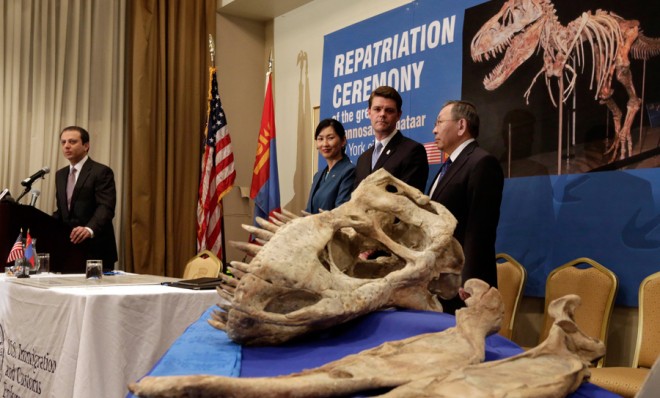3 simple tips for smuggling a gigantic, $1 million dinosaur skeleton
Assembly required

A free daily email with the biggest news stories of the day – and the best features from TheWeek.com
You are now subscribed
Your newsletter sign-up was successful
The fearsome Tyrannosaurus rex is famous for several reasons, including having comically short arms. It's also been dead for millions of years, which makes its bones, short ones and all, eminently valuable. Now, a nearly complete skeleton of one its close relatives — the Tyrannosaurus bataar — is at the center of a major repatriation effort that has seen the U.S. government return the remains to Mongolia.
The 70 million-year-old dinosaur skeleton was looted from the Gobi Desert and smuggled to the United States over a five-year period by a self-described "commercial paleontologist" from Florida named Eric Prokopi. The T-bataar was subsequently auctioned off in Manhattan in 2013 for just over $1 million, in a deal that has since been suspended.
The skeleton — originally discovered in 1954 and named Tarbosaurus bataar by Russian paleontologist Evgeny Aleksandrovich Maleev — falls under the reach of a century-old Mongolian law that establishes all historic discoveries as government property, including dinosaur fossils.
The Week
Escape your echo chamber. Get the facts behind the news, plus analysis from multiple perspectives.

Sign up for The Week's Free Newsletters
From our morning news briefing to a weekly Good News Newsletter, get the best of The Week delivered directly to your inbox.
From our morning news briefing to a weekly Good News Newsletter, get the best of The Week delivered directly to your inbox.
Naturally, sneaking a giant lizard frame around the world while simultaneously evading authorities is no easy feat — which is why Prokopi was caught. Here, three simple lessons from this strange case of dino-smuggling*:
1. Make sure your fake shipping labels aren't suspicious
T-bataar is "a very large dinosaur," John Morton, Immigration and Customs Enforcement (ICE) director, tells CBS News. "Hundreds of bones had to be brought in actually from the rock in which it was dug up in the Gobi Desert."
But when the bones were shipped to the U.S., the accompanying customs documents were riddled with glaring inaccuracies. Most egregiously, the skeleton was described as originally from England. Tyrannosaurus bataar remains have only ever been found in Mongolia. Strike one.
A free daily email with the biggest news stories of the day – and the best features from TheWeek.com
Secondly, the Bataar skeleton was grossly undervalued. According to the ICE, "Customs forms listed its value at $15,000, in contrast to the $950,000 to $1.5 million list price in a 2012 auction catalog and the actual auction sale price of $1.05 million." Strike two.
Finally, the incoming customs checklist — which erroneously included two large reptile heads — didn't match the actual cargo. Strike three.
The lesson? If you plan on getting into illegal dinosaur smuggling, be sure to hire people who are detail-oriented.
2. Know how to assemble a dinosaur skeleton
In a feat that should blow the minds of IKEA shoppers everywhere, Prokopi was said to have assembled the 8-foot-tall, 24-foot-long T-bataar skeleton once it arrived in New York, presumably without an instruction manual. Therefore, an advanced degree in paleontology from a legitimate university is highly advisable.
3. Keep the sale of a rare dinosaur on the down-low
When Prokopi's freshly completed T-bataar skeleton was slated for a May 20 bidding date with Heritage Auctions — which bills itself as "the world's largest collectibles auctioneer," mind you — Mongolian President Elbegdorj Tsakhia said, "Hey, that looks really familiar."
He was right. The dominos began to topple. Paleontologists the world over noted that T-Bataar specimens are solely indigenous to Mongolia. Prosecutors didn't waste any time dropping the hammer on Prokopi, charging him with illegally importing the T-Bataar skeleton and other dinosaur remains.
"If you are exporting from a certain country, you should know the laws," Peter Larson, a paleontologist at the Black Hills Institute of Geographic Research, tells LiveScience. "It is just a standard thing everybody should do."
*The Week obviously does not condone the illegal sale and transfer of government-owned dinosaur remains, no matter how cool they are.
-
 How the FCC’s ‘equal time’ rule works
How the FCC’s ‘equal time’ rule worksIn the Spotlight The law is at the heart of the Colbert-CBS conflict
-
 What is the endgame in the DHS shutdown?
What is the endgame in the DHS shutdown?Today’s Big Question Democrats want to rein in ICE’s immigration crackdown
-
 ‘Poor time management isn’t just an inconvenience’
‘Poor time management isn’t just an inconvenience’Instant Opinion Opinion, comment and editorials of the day